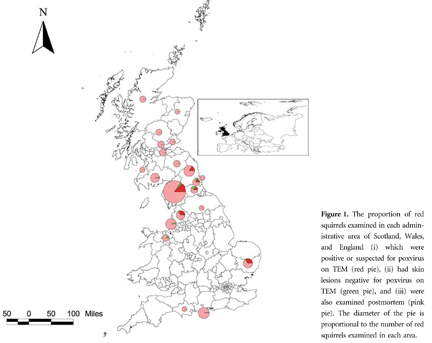When gray squirrels first came to England’s shores from North America in the 1870s, they brought with them a poxvirus that devastated the red squirrel population already inhabiting the island. Over the past century, the transmission of the poxvirus — harbored by the gray squirrel, which is immune to the disease — has given the grays a competitive advantage over the reds, allowing the invading squirrels to rapidly spread throughout England and Wales. There are now thought to be more than 2.5 million gray squirrels in existence, while the native European red squirrels’ population in England has dwindled to an estimated 15,000.
But there is good news for the red squirrel. Scientists led by the Zoological Society of London have found eight cases of free-living red squirrels that apparently managed an immune response to the deadly virus and even survived infection. The study appears in the journal Ecohealth.
“We were absolutely delighted to find signs of immunity in red squirrels after years of seeing the squirrelpox virus devastating populations throughout England and Wales,” Anthony Sainsbury, a researcher at the ZSL and the paper’s lead author, was quoted in a press release. “This finding is the first sign of hope in the long struggle to save the species from extinction in the UK.”
The researchers confirmed their suspicions that changes in the spread of the squirrel poxvirus corresponded to shifts in the geographical habitat of the gray squirrel, indicating that the gray squirrel is indeed the reservoir host of the virus. The scientists weren’t sure why, exactly, the eight red squirrels survived their encounter with the disease, although they did write: “The age structure of these eight animals suggests that younger red squirrels might be more likely to produce an effective immune response.”
Despite the seemingly hopeful news, the study authors were careful to stress that their findings do not necessarily mean the worst is over for the red squirrels, and that any suggestion the tide is turning in their favor is “countered by the incessant decline of red squirrel populations in England,” they write. The paper also points out that gray squirrels are supplanting red squirrels in Italy without the apparent aid of the poxvirus.
However, the authors write, the research might “represent a sign that the immune response of the red squirrel and the viral counter response are adapting, and the consequence is a milder disease in some red squirrels.”
Sainsbury added in the press release: “Immunity to the squirrelpox virus should give red squirrels a fighting chance against the grey invaders, without which red squirrels would undoubtedly be destined to lose the battle for survival in the UK. It is imperative that we now discover how widespread immunity to squirrelpox virus in red squirrels is, and begin the work to develop a vaccine to protect the small number of populations that still exist.”
Funding for the study was provided by Natural England, People’s Trust for Endangered Species, the Zoological Society of London, and other agencies.




